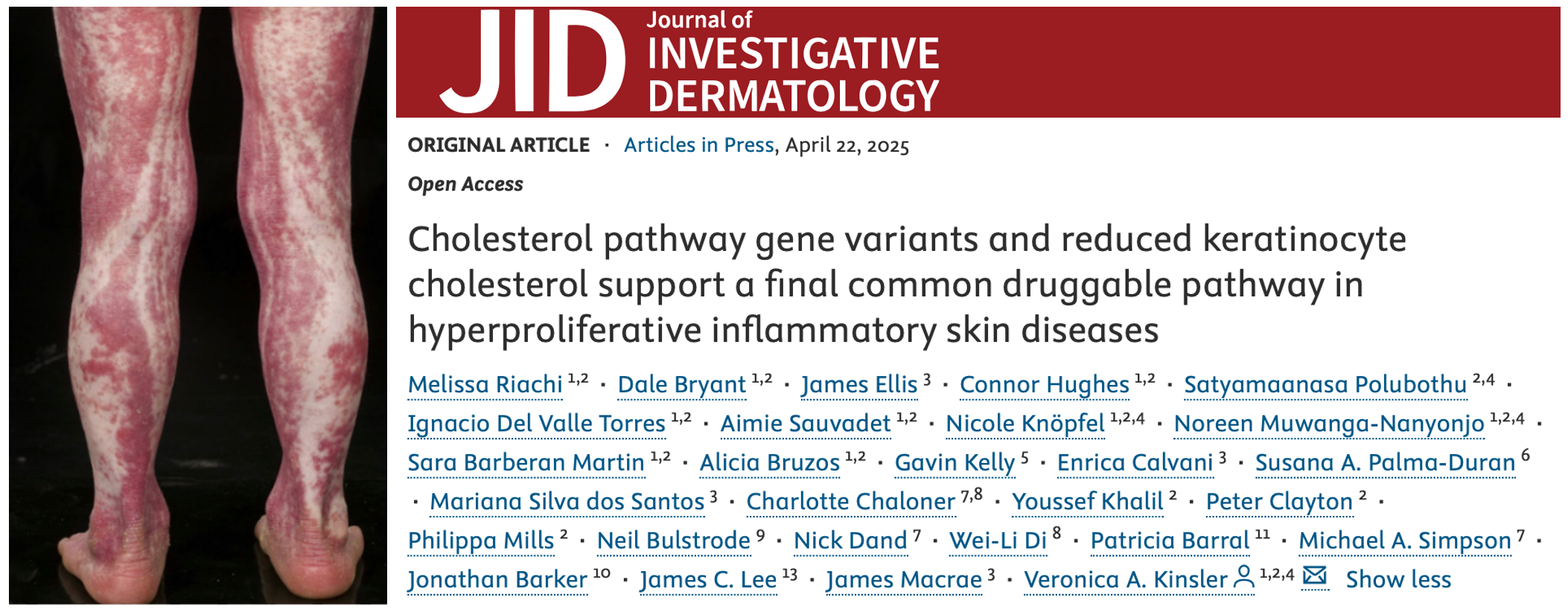Cholesterol pathway gene variants and reduced keratinocyte cholesterol support a final common druggable pathway in hyperproliferative inflammatory skin diseases
Published in The Journal of Investigative Dermatology, 2025
Recommended citation: Riachi M et al (includes Bruzos AL). 2025. "Cholesterol pathway gene variants and reduced keratinocyte cholesterol support a final common druggable pathway in hyperproliferative inflammatory skin diseases." The Journal of Investigative Dermatology, 145(11):2745-2752.e7. doi.org/10.1016/j.jid.2025.02.157. https://doi.org/10.1016/j.jid.2025.02.157

Alicia’s citation:
Riachi M et al (includes Bruzos AL). 2025. “Cholesterol pathway gene variants and reduced keratinocyte cholesterol support a final common druggable pathway in hyperproliferative inflammatory skin diseases.” The Journal of Investigative Dermatology, 145(11):2745-2752.e7. doi.org/10.1016/j.jid.2025.02.157.
All authors citation:
Riachi M, Bryant D, Ellis J, Hughes C, Polubothu S, Del Valle Torres I, Sauvadet A, Knöpfel N, Muwanga-Nanyonjo N, Martin SB, Bruzos AL, Kelly G, Calvani E, Palma-Duran SA, Silva Dos Santos M, Chaloner C, Khalil Y, Clayton P, Mills P, Bulstrode N, Dand N, Di WL, Barral P, Simpson MA, Barker J, Lee JC, Macrae J, Kinsler VA. (2025) “Cholesterol pathway gene variants and reduced keratinocyte cholesterol support a final common druggable pathway in hyperproliferative inflammatory skin diseases.” The Journal of Investigative Dermatology, 145(11):2745-2752.e7. doi: 10.1016/j.jid.2025.02.157.
About the paper:
This study takes a dual metabolimics and genomics approach to establish that hyperproliferative inflammatory skin disorders including psoriasis share a final common pathway - reduced cholesterol in skin keratinocytes - and correction of cholesterol rescues the hyperproliferation phenotype. In parallel we implicate genetic variation in lipid pathway genes in psoriasis susceptibility, potentially explaining the unsolved comorbidity of abnormal serum lipid profile and psoriasis.
Scope: We studied the role of keratinocyte cholesterol metabolism in hyperproliferative inflammatory skin diseases in 28 patients, including rare monogenic disorders and common conditions like psoriasis. We hypothesize that disrupted cholesterol pathways in keratinocytes constitute a final common, druggable mechanism underlying these diseases.
Findings/Impact: We showed that patient-derived keratinocytes consistently exhibit reduced cholesterol levels and increased proliferation, which is reversed by treatment with topical cholesterol and statin. Genetic analyses revealed enrichment of lipid metabolism gene variants in psoriasis, supporting a broader therapeutic potential for targeting cholesterol pathways in HISDs.
My contribution: I was involved in the bioinformatic analysis of RNA-Seq data. Personal importance: This publication was part of a collaboration of my postdoc in the United Kingdom.
Authorship:
Position of AL Bruzos: 11
Total number of authors: 28
Authors: Melissa Riachi, Dale Bryant, James Ellis, Connor Hughes, Satyamaanasa Polubothu, Ignacio Del Valle Torres, Aimie Sauvadet, Nicole Knöpfel, Noreen Muwanga-Nanyonjo, Sara Barberan Martin, Alicia L. Bruzos, Gavin Kelly, Enrica Calvani, Susana A. Palma-Duran, Mariana Silva dos Santos, Charlotte Chaloner, Youssef Khalil, Peter Clayton, Philippa Mills, Neil Bulstrode, Nick Dand, Wei-Li Di, Patricia Barral, Michael A. Simpson, Jonathan Barker, James C. Lee, James Macrae, Veronica A. Kinsler
Journal information
ISSN: 0022-202X
eISSN: 1523-1747
Current Publisher: ELSEVIER SCIENCE INC, STE 800, 230 PARK AVE, NEW YORK, USA, NY, 10169
Journal Impact Factor (JIF)
-JIF: 7.590 (2021)
-JIF Rank: 5/68 (2021)
-JIF Quartile: Q1 (2021)
Journal Citation Indicator (JCI)
-JCR Category: DERMATOLOGY
-JCR Category Rank: 6/70
-JCR Category Quartile: Q1
Peer-review process:
Received: 27 June 2023
Accepted: 2 February 2025
Published: …
